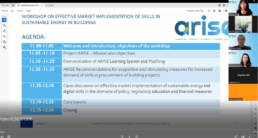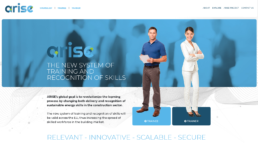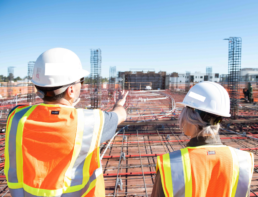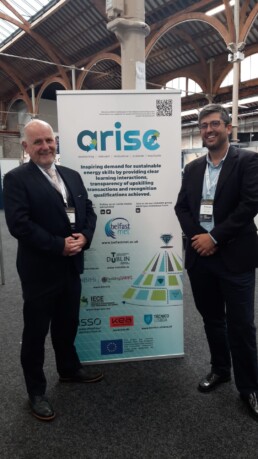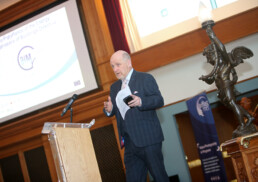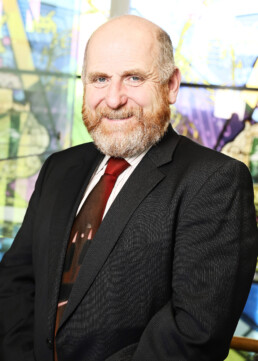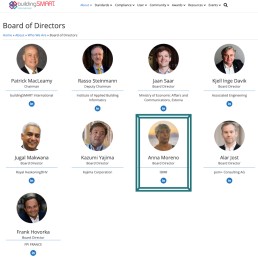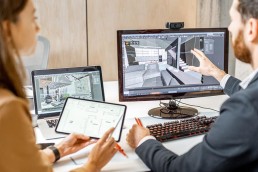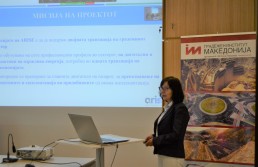ARISE PROJECT - Workshop on effective market implementation of sustainable energy and digital skills in construction sector
On 10 th September 2024, the ARISE Project organized an International Workshop on market implementation of sustainable energy and digital skills in the construction sector.
Designed as an online communication event, the main objective of the ARISE International Workshop was to allow the stakeholders of the building supply chain, from different countries, to share experiences and opinions on market demand and implementation of competencies in sustainable energy and digital skills, in the procurement of building projects.
Through a unique combination of presentation and discussion sessions, during which ARISE main achievements were presented and discussed with over 50 participants from more than 10 countries (UK, IE, PT, MK, NL,IT, BE, CR, EL, DK, etc.), with a variety of professional profiles in policy, procurement, academia, and industry.
Share of opinions, suggestions, and examples of good practices had transnational dimensions, as it was conducted through three modes of communication among the participants an interactive dashboard, live discussion and share of suggestions in online chat form.
The main takeaways were:
- There is a recognized need and recognized benefits at both supply and demand side, for including competences in sustainable energy anddigital skills in requerments of procureement of building projects,
- To start or intensify reforms in procurement in this direction, a set of measures needs to be considered, developed and deployed,
- All actors need should get involved and know their roles and responsibility of the process,
- Including private sector is very important, as most of the building stock (about 70 percent) are privately owned buildings,
- In the same time with starting / ongoing national reforms, efforts towards an internatonal common approach for recognition of skills should be enforced,
- International platforms enabling communication channels for share of best practices, such as ARISE, have an importnat role and ameaningful impact for the reforms initiation and start,
- ARISE demonstrated and tested prototype of approach and method of learning was found a way forward to resolve access to education and contribute to the increased demand for competencies in procurement:
- By its format of delivery that is suitable and feasible for professionals ( online, blended, micro modules, training plan, accumulative, non linear, customizable)
- By the way of recording the upskilling and facilitating cross region recognition ( micro badges)
- with a Framework that addresses the shortage of skills (4 groups, task based- micromodule framework)
The European construction sector opinions, collected during the event will be used by the project team to develop recommendations to all European countries to adopt a common approach for sustainable energy and digital skills demand and recognition, through a Framework of effective intervention strategies, impacts and advancement in policy, regulatory, financial stimulus and professional education improvements.
ARISE e-learning platform on BIM and applied energy efficiency tools. ARISE webinars for Trainees (17 th January 2024) and Trainers (21 st February 2024), Webinar recordings.
ACE has organised two successful webinars with the collaboration with BUILDUP Team in January and February 2024 on the topic of “ARISE e-learning platform on BIM and applied energy efficiency tools” addressed to Trainees and Trainers.
The EU funded project ARISE has launched the e-learning platform on BIM and energy efficiency in buildings for the design and construction sector. This e-learning platform provides micro-learning units available anywhere, anytime. The platform covers an introduction to BIM terms and definitions, BIM benefits, and BIM tools for energy. The short duration learning modules offer clear and straightforward content adapted to the busy life of professionals and workers. The learning pathway can be personalised to match the skill gap of each learner. In less than an hour of study, the learning units provide clear, straightforward content relevant to the working lives of professionals. The e-learning platform is a powerful tool for improving the skills of teams based in different locations. The e-learning platform is very crucial for the professional and workers upskilling and re-skilling is the cornerstone of the implementation of the digital transformation in the design and construction industry. Innovative learning methodologies, materials and tools are the foundation to reduce the labour shortage and increase the offer of digital skilled professionals.
First Webinar for Trainees: The first webinar provided information by ARISE Partner and Curriculum Area Manager Construction & The Built Environment Belfast Metropolitan College, Andrew Hamilton, on the topic of "Digitalization to the Built Environment: ARISE Approach." The presentation on the digital transformation of the design and construction sector addresses the labour shortages, the new interface of upskilling training, and the benefits driven by the digitalization of the sector. Among other topics, Andrew Hamilton outlined how the ARISE training methodology is flexible allowing people to step on or step off, recognising the various points of their career and educational experience to date. And also, for those with no educational experience, to bring them on board and align them to gain the skills they need to have jobs and roles across the various sectors. Besides, ARISE partner and Researcher at TUDublin Ryan Dempsey discussed on the topic of "ARISE e-learning platform and the microlearning contents" which are already available on the ARISE Platform website. He presented what will be offered to the user, such as the deployment of different tools and teaching methods to cater for different learning styles. The last part of the webinar provided information about the ARISE offers presented by ARISE partner and Responsible for the international affairs BuildingSmart Italy - IBIMI Anna Moreno. At the end of the session, most of the Trainees were interested in the ARISE e-learning platform and the contents of the platform that ARISE offers. The majority were also interested in learning about ARISE platform developers and content creators, modules, module contents, badges, and certification. If you miss the first webinar, catch up with the video recording here.
Second Webinar for Trainers: The second webinar started with a session about ‘Digitalisation to the Built Environment – ARISE approach’, which delved into the improvement digitalisation can bring to the building sector. Paul McCormack from the Belfast Metropolitan College. Then, Ryan Dempsey from TUDublin gave an overview of the ARISE platform and how trainers can use it as an e-learning tool and highlighted that trainers could use the ARISE platform as a learning materials database to tailor the courses for specific users’ classes. The final part of the webinar focused on ARISE framework by Jaap Kolk from Building Changes focusing on the ARISE framework structure, which comprehends BIM application, utilisation, support, and basics. He highlighted that the ARISE learning framework also helps within projects, by linking the skills needed to the people providing them. The webinar ended with an interactive podium discussion, facilitating an exchange of questions between the speakers and the audience. If you miss the second webinar, catch up with the video recording here.
Create your account and sign up for free at ARISE e-learning platform modules here.
The role of ARISE in the implementation of the new RES directive
Anna Moreno, Caterina Nissim
The proposal for a new directive on the promotion of renewable energy sources
The DIRECTIVE OF THE EUROPEAN PARLIAMENT AND OF THE COUNCIL amending Directives (EU) 2018/2001 and 98/70/EC, and the Regulation (EU) 2018/1999 as regards the promotion of energy from renewable sources is a proposal presented in July 2021. Some of the amendments are related to the national system for the qualification system of designers and installers of Renewable Energy Sources (RES) and they are therefore relevant for the ARISE partners.
Let’s examine these modifications in more detail.
Addressing the shortage of competent installers
This proposed modification intends to provide more experts in the domain of designers and installers of RES technologies but also to give the opportunity to other innovative technologies to be promoted thanks to the support of proper qualifications and certification systems. Below, In italic, the original text:
Article 1(7) amends Article 18(3) REDII with adjusted paragraphs on the qualification and certification requirements of installers to deal with the fact that there is a shortage of installers of renewable heating systems, which is a ‘brake’ on phasing out fossil fuel systems. It also deletes list of specific types of renewable heating technologies and replaces it by a generic reference to RES heating systems.
This proposition opens the market to innovative solutions. The ARISE's objective is to deliver a common platform where the competences about the new technologies are based on knowledge, skills and the degree of autonomy following the European Qualification Framework (EQF). For example, the producer of a new technology will be able to provide both the list of the new competences needed to design and install the new system and provide the body of knowledge for training workers and designers. This way, the developers of the new technology will be able to upload to the platform the body of knowledge required to design and/or develop training materials on the correct use of the new technology.
Making a public list of installers a requirement in each Member State
The new directive makes the creation of a public register a requirement:
It amends Article 18(4) REDII by obliging Member States to put in place measures to support participation in training programmes. The previous possibility for Member States to make the list of qualified installers public becomes a requirement.
In the deliverable 2.4, to be published soon on the ARISE web site, we mention the heterogeneity of the Member States on the issue. In countries such as Ireland and the Netherlands, public registers are already required and managed by a national organism while other countries, Portugal and Italy to mention a couple, are still far from the target. In Italy, the qualifications for the installers are realised at regional level, making the development of a national register extremely complex. ARISE will present a solution on a European scale, as the certification of the single competences would provide the tools to develop a singular national/European register. For each technology, it will be identified a list of compulsory competences at European level and each country/region will be able to identify the designers and workers who own those competences.
Requiring transparency in certification schemes issued by Member States for a mutual recognition
In Article 18, paragraphs 3 and 4 are replaced by the following:
- Member States shall ensure that certification schemes are available for installers and designers of all forms of renewable heating and cooling systems in buildings, industry and agriculture, and for installers of solar photovoltaic systems. Those schemes may take into account existing schemes and structures as appropriate, and shall be based on the criteria laid down in Annex IV. Each Member State shall recognise the certification awarded by other Member States in accordance with those criteria.
The ARISE platform will provide the tools for mutual recognition. Each Member State will identify its need in competences for each specific technology by referring to the ARISE platform unit of competences. The need in competences are obviously different in each country, depending on the climate, national regulations and so on. Thanks to an adaptation of these needed competences in each different country on the ARISE platform, it will be possible for workers to move and relocate in different countries all over Europe.
Increasing the number of qualified installers covering renewable heating and cooling technologies
Member States shall ensure that trained and qualified installers of renewable heating and cooling systems are available in sufficient numbers for the relevant technologies to service the growth of renewable heating and cooling required to contribute to the annual increase in the share of renewable energy in the heating and cooling sector as set out in Article 23.
To achieve such sufficient numbers of installers and designers, Member States shall ensure that sufficient training programmes leading to qualification or certification covering renewable heating and cooling technologies, and their latest innovative solutions, are made available. Member States shall put in place measures to promote participation in such programmes, in particular by small and medium-sized enterprises and the self-employed. Member States may put in place voluntary agreements with the relevant technology providers and vendors to train sufficient numbers of installers, which may be based on estimates of sales, in the latest innovative solutions and technologies available on the market.
ARISE has conceived an “open platform” guaranteeing the opportunity, for any professional and worker, to reach the desired “maturity level” for any technology necessary for their work as self-employed or employee. The ARISE platform is also open to producers who wish to ensure that designers and installers own the right competences to design and install their technology correctly.
Public lists of qualified/certified installers
- Member States shall make information on the certification schemes referred to in paragraph 3 available to the public. Member States shall ensure that the list of installers who are qualified or certified in accordance with paragraph 3 is regularly updated and made available to the public.
ARISE will provide a system to certify the single competence through blockchain technology. This means that each competence acquired will be certified and it will not be possible to “manipulate” it. The union of all competences required by each Member State to perform a specific activity, will be identified in the same ARISE platform so that workers will know what the gaps consist in.
Accreditation of the training programs
- The accreditation of the training programme or provider shall be affected by Member States or by the administrative body that they appoint. The accrediting body shall ensure that the training programme offered by the training provider has continuity and regional or national coverage.
The training provider shall have adequate technical facilities to provide practical training, including sufficient laboratory equipment or corresponding facilities to provide practical training.
The training provider shall offer, in addition to the basic training, shorter refresher and upskilling courses organised in training modules allowing installers and designers to add new competences, widen and diversify their skills across several technologies and their combinations. The training provider shall ensure adaptation of training to new renewable technologies in the context of buildings, industry and agriculture. Training providers shall recognise acquired relevant skills.
The training programmes and modules shall be designed to enable life-long learning in renewable installations and be compatible with vocational training for first time job seekers and adults seeking reskilling or new employment.
The training programmes shall be designed in order to facilitate acquiring qualification in different technologies and solutions and avoid limited specialisation in a specific brand or technology. The training provider may be the manufacturer of the equipment or system, institutes or associations.
The ARISE partners do not intend to organize trainings themselves, but to support training institutions by providing the tools to train and qualify blue and white collars for each technology. The platform will be the hinge between two worlds: the technologies producers and the workforce. Training providers will be able to propose the right qualifications selecting the competences in the ARISE platform and accessing to the right training materials. A minor percentage of the fee charged for the courses will be directed to the ARISE platform managers to ensure a regular update of contents. The training providers will manage the access to the trainees who wish to certify their competences with blockchain through the platform.
ARISE’s ultimate goal is to revolutionise the learning process by changing both delivery and recognition of sustainable energy skills in the construction sector. The new system of training and recognition of skills will be valid across the EU, thus increasing the spread of skilled workforce in the building market. The ARISE platform will be the tool to facilitate the duty of any stakeholder of the building chain (owners, producer, training institutions, workers, designers, regional and national qualification organizations) and will substantially contribute to the mobility of workers and services in the building industry through all Europe and beyond.
Anybody interested in contributing to the testing of the platform, please contact us and join our Forum on LinkedIn to participate to open debates.
BIM Coordinator article 2022
ARISE Programme Manager Paul McCormack spoke at the 2022 BIM Coordinator Summit in the RDS in Dublin on September 8. Paul wrote an article for the event, 'What is it that we cannot see ?' Read here:PAUL BIM CORD ARTICLE
BIM Basics article
ARISE Programme Manager Paul McCormack has written 6 BIM related articles in the past year for the Dublin based Building Services magazine. Read article 2 of the 6 here: ARTICLE 2- BIM Part 2
Digitalisation in the Built Environment article
ARISE Programme Manager Paul McCormack has written six articles on BIM for the Dublin Building Services magazine. Article one is 'Digitalisation in the Built Environment'. Read the attached link.ARTICLE 1-Digitilisation
Anna Moreno from ARISE Partner appointed to directors' board at Building Smart
During the first day of the buildingSMART International Council, which took place in Zurich on June 28 and 29, the members of the Board of Directors were announced.
Among the new appointments to the Board, we are thrilled to announce the election of IBIMI buildingSMART President Anna Moreno, who commented on her election as follows:
"I have known the interoperability industry for more than 30 years. I served on the ISO TC 184 -SC4 technical committee as an expert on traceability of information regarding materials. I remember my first meeting, it was held in Turin and more than 200 people participated divided into various breakouts: buildings, ships, aircrafts... I asked, "But where are the Italians?" They answered, "You are the only one" and I remained the only Italian for over 25 years.
So when I decided to found IBIMI, which is our association of BIM professionals, I told myself I didn't want to be alone anymore. Today we are the Italian chapter of buildingSMART and we have about 200 members. Thank you for this opportunity, it's really nice not to feel alone anymore!"
IBIMI- Institute for BIM Italy- is a nonprofit association that promotes and supports the digitization of the construction industry, and is the Italian Chapter of the global community buildingSMART. The association is a partner in the ARISE project, leading the WP2 "Benchmarking Energy e Digitalisation Skills"
The Italian Strategy for the qualification of BIM Professional Roles
Over the course of the last few years, IBIMI has developed the so-called Italian OpenBIM roadmap. It is like a path in which to grow and consolidate as an association on a Italian national scale and to be able to give BIM professionals the opportunity to be certified internationally according to the certification programme of buildingSMART International, an international body that oversees the development of open standards such as the IFC format. Common language and shared process are the founding bases that BIM professionals involved in the management of information throughout the building or civil supply chain (survey, design, construction, use, decommissioning) must possess.
On this assumption IBIMI is at the forefront of the development of certifications for figures such as BIM Specialist, Coordinator and Manager. These certifications will cover one of the first important milestones of the buildingSMART certification programme together with the, already widespread in Italy, Individual Qualification on the foundations of BIM methodology.
The association aims to make these certifications and related courses, available by training providers, by the end of this year or by the beginning of next year. The vision is to be able to develop certifications for other types of BIM professionals in the coming years, such as the CDE Manager, site operator, and so on.
On this page you will find the link to download the full document "THE ITALIAN STRATEGY FOR THE QUALIFICATION OF BIM PROFESSIONAL ROLES": https://www.ibimi.it/download/
ARISE Partner Meeting in North Macedonia-June 21-22, 2022
ARISE Partner Meeting in North Macedonia
The latest Meeting of the Belfast Met led £1.12 million EU digital construction project, ARISE is being held this week in North Macedonia, (June 21-22)
At the home of ARISE Partner IECE, (Institute for Research in Environment, Civil Engineering and Energy) in Skopje, North Macedonia, the nine core ARISE European partners are meeting to continue their transformational work in empowering the digital transformation of the built environment.
The open session event was themed: ‘Improvement and recognition of digital and sustainable energy skills in the construction sector of North Macedonia-needs, opportunities and challenges,’ and detailed the leading role the country is playing, leveraging skills transformations to achieve carbon reductions in the built environment
The Keynote Speaker of the event was Mr Deyan Metikosh, Vice President of the Chamber of Certified Architects and Engineers of North Macedonia. Mr Metikosh spoke on ‘Digital transformations and BIM Methodology-the priority in the processes of continuous improvement of skills of certified architects and engineers’.
Also among the speakers was Mr Vlatko Ivanov, General Manager of Civil Engineering Institute Macedonia who spoke on ‘Needs of the construction sector in North Macedonia for upskilling the knowledge and skills.”
Mrs Dijana Likar, Co Ordinator of the IECE Project team presented on ‘Project ARISE in perspective of national stakeholders’.
ARISE Programme Manager Paul McCormack said: “The ARISE project seeks to create a level digital skills playing field across Europe and to support industry and individuals within the built environment to map their individual digital transformation journey. Through micro credentials, certcoins, time credits we can revolutionise the skills process for blue and white collar workers. With these new skills we can also help decarbonise construction and stimulate energy skills across all levels within construction. Our ARISE Partners from Italy, North Macedonia, Portugal, Ireland, UK, Brussels and Denmark are all contributing to developing this new trans European skills process. Our Partner Meeting in Skopje, North Macedonia is another step in creating new learning pathways.”
The new system of training and recognition of digital skills will be valid across the EU thus increasing the spread of skilled workers in the building market.
Ends
SEAI Breakfast BIM briefing
USING BIM TO CONTROL ENERGY IN THE BUILT ENVIRONMENT
On March 30-31, 2022 the SEAI Breakfast Briefing was held at the SEAI Energy Show in Dublin. The briefing focused on: USING BIM TO CONTROL ENERGY IN THE BUILT ENVIRONMENT
The panel members included: Dr Avril Behan, Project Director, Build Digital, TU Dublin, Michael Curran, Chairman CIBSE Ireland and Head of Building Services, Energy and Utilities, NUIG, Michael Early, BIM Champion and BIM Manager, DAA, Joseph Mady, MD, Digital Construction technologies and Eamonn Sheils, SEAI Programme Manager-Commercial Retrofit.
While digitalisation of the construction process is now recognised as the way forward if we are to realise net zero energy and carbon buildings, BIM is the enabling tool that will make the transformation possible. BIM can transform traditional information processes into data that is easier analysed and shared across the AEC sector so that architects, engineers and contractors communicate on a common platform.
However, as with all new processes and technologies, there is a learning curve for those involved. Hence, this breakfast briefing comprised a panel discussion between experts from each of the key construction disciplines who shared their experience and opinions on how BIM can best be utilised, and the various challenges posed can be met.
The presentations and discussion covered four primary quadrants of the energy cycle – Plan: Potential energy; Design: Embedded energy; Build: Operational energy; and Operate: Sustainable energy.
https://www.youtube.com/watch?v=J6-TYTruJSc
